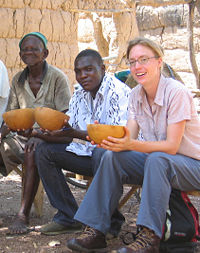Almut Brunner
From Santa Fe Institute Events Wiki

Hi all,
I am a PhD student in my final year at the Center for Development Research (ZEF), University of Bonn in Germany. My research interests include environmental modeling, scaling theories, soil degradation and the integration of physical, bio-economical and social models.
For my PhD thesis, I have been working for some years in Burkina Faso, where I tried to quantify siltation of small dams and to assess soil erosion at hillslope and catchment scale. During my field work, I analyzed a wide range of environmental components influencing soil degradation, such as climatic, hydrologic, pedogeomorphologic and social-cultural parameters by technical equipment or by socio-economical and participative methods (see photo).
However, as longer as I am dealing with complex systems, as more I realize that although it is possible to determine the driving variables of a system in a reductionistic way, it is not possible to capture the interaction and non-linear dynamics between them by current scientific models/tools. Therefore, I would like to look at the interrelated dynamics of environmental/social systems in a more holistic ways and I am very glad to learn and discuss more about complexity in the interdisciplinary summer course at Santa Fe.
Besides work and extended traveling to Africa, Asia and Europe, I love sports (swimming, tap dance, salsa, basketball) and I used to play piano and tenor saxophone (which is unfortunately to heavy to bring along).
I am looking forward meeting you all very soon in Santa Fe.
Please feel free to contact me at abrunner@uni-bonn.de
1. What are your main interests? Feel free to include a "pie in the sky" big idea!
First of all, working on environmental systems and its impacts on social societies, I am looking for new approaches to link/couple/integrate the dynamics and feedback mechanisms of both of these systems. In this context, I am interested in the self-organization and emergence of landscape processes and the adaptive dynamics of human systems. Are there more adequate tools, models or theories to overcome the reductionistic way of aggregating single components and variables of a system and identify instead the more complex, more holistic structure of non-linear dynamics?
Secondly, as I am dealing with spatial scales for soil erosion research, I am very interested in scaling theories and pattern formation. For example, how can detailed small-scale processes at hillslope scale be accounted for in hydrological predictions at catchment, watershed or even landscape scale? Or in other words: How much complexity and how much simplicity is required at different scales? Are there any new ways compared to the commonly used aggregational upscaling and simplified downscaling approaches?
And last but not least, I have been always very curious about the theoretical framework and methodological, often more philosophical concepts of complexity and scientific theories.
2. What sorts of expertise can you bring to the group?
As a geographer by training, I am permanently working on the interface between physical, environmental science and human, social science. Therefore, I have focused most intensively on soil erosion research and environmental/social modeling. I could offer some insights into soil erosion modeling (empirical, spatially-distributed and physically based models, e.g. USLE, WaTEM/SEDEM, WEPP) and present various field methods to calibrate and validate these models. Furthermore, I gained some fundamental knowledge about the concept of time and space in geography and more recently some first insights into complexity and spatial patterns in geomorphology.
Engaged for some years in interdisciplinary projects mainly in developing countries, I have also expertise about development theories and I am aware of the advantages and constraints of interdisciplinary research projects and its implications.
3. What do you hope to get out of the CSSS?
I hope that the course will provide me with new insights, ideas and more adequate (modeling) tools to follow my research interests more closely. As most of the above mentioned questions might not be solved easily and I am just at the beginning of my scientific way, I do not expect any simple solutions or take-away answers, moreover, I hope to gain knowledge about some challenging methods and hands-on experience to approach a more complex way of thinking. Furthermore, as the CSSS is a wonderful opportunity to meet young researchers with various backgrounds form all over the world, I am looking forward having intensive discussions on complexity and building up an interesting scientific network.
4. Do you have any possible projects in mind for the CSSS?
I would like to work on a project considering natural/environmental processes and human-induced dynamics by accounting for the interaction/feedback mechanisms between both systems. An example for a very complex system could be the process of soil erosion: The loss of fertile topsoil from hillslopes might lead to a loss of soil fertility, a reduction of crop yield and finally to reduced harvest. This might, in return, influence farmers economic behavior (e.g. investment, income, prices of products, markets) and his agronomical decisions (e.g. fertilizer input, diversification of crops, soil and water conservation methods) and could have in long-term an effect on the settlement structure (e.g. abandonment of land, migration) and population dynamics. Regarding the landscape, severe soil loss might provoke pedological and hydrological changes on-site (e.g. erosion rills, gullies, laterite formation) and lead to severe sedimentation and siltation of small reservoirs off-site, which might have again an impact on farmers agricultural land, irrigation practices, water quality and hence human decisions.
However, I am also very open for other environmental/social projects, e.g. the effects of natural hazards on landscape and humans or the impact of ecosystem vulnerability/resilience on social societies. As I am not yet familiar with agent-based models and cellular automata, I would welcome the opportunity to get to know these or other new approaches within a specific project.
